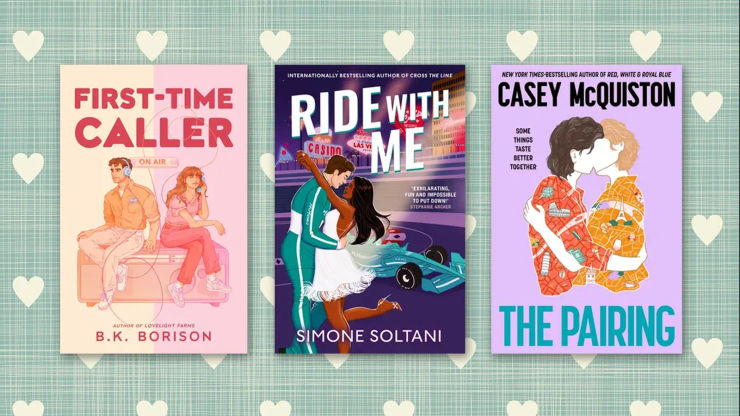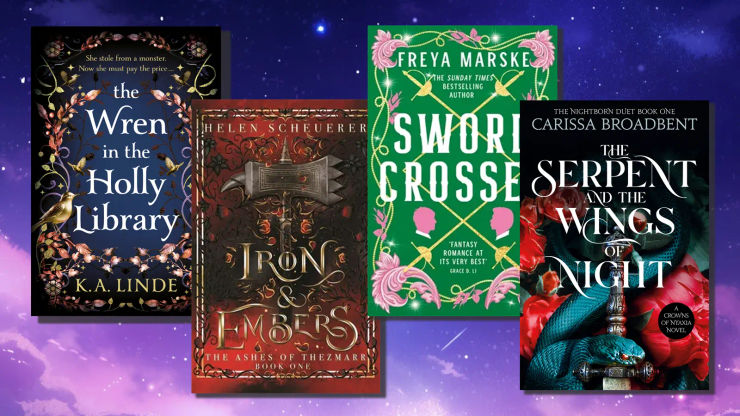What’s the difference between a love story and a romance novel?
We take a look at what makes romance, Romance.

Warning: this article contains some plot spoilers.
Romance is dead. Long live romance. From its roots in eighteenth century ‘conduct literature’ via Jane Austen, bodice rippers and Mills & Boon, to today’s increasingly representative and diverse romantic fiction, this is a genre that has evolved alongside its readers. But while a romance novel needs a love story, a love story isn’t always a romance. So what’s the difference? We take a look at the two things a book needs to qualify as part of the romance genre.
In a romance novel, the love story is the main plot, and point, of the book
This is not to say that romance novels don't address and explore ideas and concerns outside of the central relationship. There may well be subplots. The protagonists may well have other things to worry about – from the fate of their Christmas tree farm to the first term of the first woman President of the United States – but the real conflict and culmination of the story relates to the relationship, and everything else that happens is ultimately serving that central narrative.
In Pride and Prejudice, both romantic lead Elizabeth Bennet and her narrator are pretty cutting about the societal dynamics of Regency England and what they mean for women. Yet it’s hard to deny that such prickliness mainly serves to give the reader a likeable, sharp heroine and an enemies-to-lovers story arc, given she ends up married to Darcy and, conveniently, his enormous estate, by the end.
‘If the central love story isn't the main thing at stake, then it’s not a romance. This doesn’t mean that the love story isn’t important to the book, or the part we care most about, but it's performing a different role.’
As a more modern example, the central premise of Beth O’Leary’s The Flatshare is based on the lack of affordable housing, and the female protagonist has recently left an abusive partner. But the former is, fundamentally, a neat and original means for a subverted meet-cute. And whilst it would be offensive, and inaccurate, to dismiss the inclusion of coercive control as a device to push forward Tiffy and Leon’s romance, it is also not the central thrust of the novel. We are undoubtedly rooting for Tiffy to rebuild her life, but we’re rooting for her to do it with Leon.
If there’s anything other than the central relationship at serious stake, then the love story you're reading is just that: a love story. This doesn’t mean that it isn’t important to the book, or the part we care most about, but it's performing a different role. A soul-capturing love story is an extremely effective and affecting way to engage us with something larger. It gets us invested and through this builds our investment in everything that surrounds it. In Aleksandar Hemon’s The World and All That It Holds it’s the luminous thread through a torn tapestry of war, revolution and death. In Sorrow and Bliss it’s one of the many parts of Martha's life splintered by long term mental illness. For Frankie, in Kristin Hannah’s incredible Vietnam war-set The Women, it's one of many trials she must overcome in a devastating story of courage, endurance and rage.
So what about Sally Rooney’s Normal People, or David Nicholls’ One Day and Sweet Sorrow? The love stories are the driving forces of these books – are they romance novels?
In romance novels, you're guaranteed a happy ever after
And that happiness revolves around the leads being together. And so, as readers of Rooney and Nicholls will know, while their writing is often deeply romantic, they are not romance writers.
Romance novels are all about wish fulfilment. We go in wanting and expecting a certain outcome, we root for the characters as they progress towards it and we get what we want. There’s a comforting familiarity in knowing what’s going to happen; the surprise coming from the how and the why, rather than the what and the where. And there’s real skill in creating and maintaining a sense of anticipation for the reader when the ending's inevitability could make things feel flat and blunted by predictability.
Alongside the endorphin rush of the happy ending we were hoping for, there’s also something delicious in knowing what’s coming when the characters themselves don’t. It can create moments of comedy, add levity to moments of tension or, conversely, make them more powerful, and increase our sympathy. It makes us more sensitive to the little details, the signs that two people are falling for each other which we might not notice were we not looking out for them: a fleeting movement of the hand, a passing remark.
It also puts us in a certain position of power – when we're aware of the characters' fate before they are, we're almost colluding in it. We feel more involved. Knowing the end before we start makes us both relinquish control and feel like we have more of it. It’s a beguiling dynamic.
‘In a romance, the plot reflects the desires of the reader: we go in wanting and expecting a certain outcome, we root for the characters as they progress towards it and we get what we want. ’
The current emphasis on and explicit references to tropes in modern romance publishing only adds to this. Romantic tropes (enemies to lovers, opposites attract, brother’s best friend, forced proximity. . .) are nothing new but their heightened visibility suggests an increased desire in us to be able to choose exactly the kind of story we want to read. Tropes help us find what we’re in the mood for, and give an insight into the how as well as the what.
Could this, alongside the current explosion in the genre more generally, be indicative of a generation of readers subconsciously seeking a feeling of control and security (not to mention togetherness) in a world that feels increasingly divided and unstable? In contrast to reading the books, the truth may only be known in hindsight, but we should never underestimate the power of a good romance.











